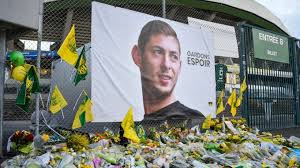March 16 – The official report into the plane crash that tragically killed Argentine footballer Emiliano Sala has found the pilot was “not licensed” to fly the aircraft at the time of the accident.
Sala died on January 21 last year when the light aircraft carrying him to Cardiff two days after he signed from Nantes crashed into the English Channel near Guernsey before he could play a single game for the Welsh club. The dispute over who was liable for Sala’s €17 million fee has dragged on ever since.
The long awaited full report into the crash from the Air Accident Investigation Branch (AAIB) said pilot David Ibbotson lost control of the Piper Malibu aircraft, which broke up mid-flight during a high speed manoeuvre. The report found he was wrongly authorised to fly aircraft at night and that he was paid a fee despite only having a private pilot licence.
“The pilot lost control of the aircraft during a manually flown turn,” the Air Accidents Investigation Branch said. “The aircraft subsequently suffered an in-flight break-up while manoeuvring at an airspeed significantly in excess of its design manoeuvring speed.”
The report found that Ibbotson, whose body has never been found, was probably manoeuvring to avoid poor weather – heavy rain showers – just before the plane crashed. Investigators concluded that the plane was flying at 245 knots at the time of the accident – far above the 203 knots maximum speed allowed.
It concluded that the pilot had no training in night flying and that he was probably suffering from carbon monoxide (CO) poisoning when the accident happened though that was possibly caused by a fault in the exhaust tailpipe which allowed gas to enter the cabin through the heating system.
Crispin Orr, chief inspector of the AAIB, commented: “Equipping aircraft with devices that provide warning of the presence of this odourless, colourless and lethal gas, would enable pilots to take potentially lifesaving action.”
And on the issue of neither pilot nor aircraft having the correct licences, he said: “The chartering of aircraft that are not licensed for commercial transport – so called ‘grey charters’ – is putting lives at risk.”
Contact the writer of this story at moc.l1734839960labto1734839960ofdlr1734839960owedi1734839960sni@w1734839960ahsra1734839960w.wer1734839960dna1734839960

